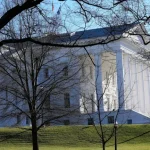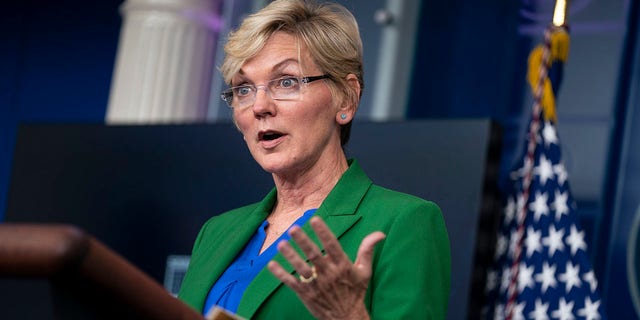
The Biden administration defended giving a $200 million grant to a battery component manufacturing company with ties to the Chinese government.
In October, the Department of Energy (DOE) awarded the grant to Microvast, a Texas-based maker of technology for electric vehicle batteries, under the $1 trillion infrastructure package President Biden signed into law in November 2021. Microvast was one of just 20 American companies to receive a portion of the nearly $3 billion appropriated for a program designed to boost domestic battery manufacturing capabilities.
However, 69% of Microvast’s revenue was generated in China and just 3% came from the U.S., according to a third quarter financial disclosure it filed with the Securities and Exchange Commission (SEC) last month. In the same filing, the company acknowledged that the Chinese government “exerts substantial influence” over its business activities and “may intervene at any time and with no notice.”
“Microvast is an American battery company,” a DOE spokesperson told Fox News Digital in a statement. “And thanks to the Bipartisan Infrastructure Law, it no longer needs to look to China to establish its manufacturing facilities. The President’s historic agenda is helping to reshore manufacturing back to the U.S.”
SPECIAL COUNSEL RULES BIDEN’S ENERGY SECRETARY VIOLATED HATCH ACT
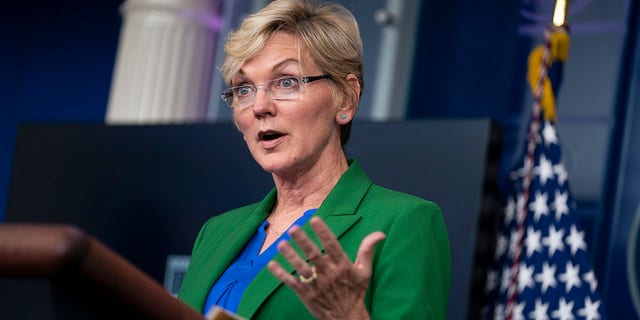
Energy Secretary Jennifer Granholm speaks during a press briefing at the White House. (AP Photo/Evan Vucci)
“The DOE award to Microvast, coupled with the company’s significant matching funds, will allow Microvast to build a separator production plant here at home,” the spokesperson added.
But the company’s ties to China appear to be deeper than operating a factory in the country.
In 2006, Microvast incorporated in Stafford, Texas, and simultaneously incorporated Microvast Power Systems, a subsidiary firm, in Huzhou, China. Four years later, in 2010, Microvast began producing components for lithium batteries in Huzhou where its subsidiary is based.
Microvast Power Systems also signed an agreement in December 2018 with local government entity Huzhou Saiyuan to issue convertible bonds. As part of the arrangement, Microvast pledged its 12.39% equity holding of Microvast Power Systems to Huzhou Saiyuan to facilitate the issuance of convertible bonds.
And in its recent SEC filing, the company repeatedly acknowledges the influence the Chinese (PRC) government has over its operations.
“The PRC government may exert, at any time and with no notice, substantial interventions and influences over the manner in which we conduct our business activities, which we may not be able to anticipate,” the company stated.
“If the PRC government decides to substantially intervene, influence or establish new policies, regulations, rules or laws affecting our business, said substantial intervention or influence may result in a material change to our operations … and could significantly limit or completely hinder our ability to offer or to continue to offer securities to investors, and/or cause the value of such securities to significantly decline or be worthless,” it added.
In addition, Yang Wu, Microvast’s CEO, chairman and founder, attended Southwest Petroleum University in Chengdu, China.
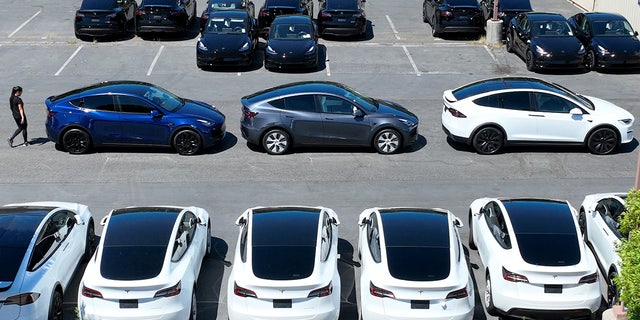
Tesla cars sit in a parking lot at a Tesla showroom on June 27 in Corte Madera, California. (Justin Sullivan/Getty Images)
The infrastructure law, under which the DOE awarded the grant to Microvast, was specifically designed to boost domestic manufacturing capabilities that untethered American supply chains from China. The legislation implores the DOE not to issue grants to companies that “use battery material supplied by or originating from a foreign entity of concern” or companies “subject to the jurisdiction or direction” of China.
Still, Energy Secretary Jennifer Granholm touted Microvast and the other grant recipients as examples of companies that would boost “American-made” batteries after the agency announced the grants in October. The company said it would use the money to build a factory in Clarksville, Tennessee.
“This is truly a remarkable time for manufacturing in America, as President Biden’s Agenda and historic investments supercharge the private sector to ensure our clean energy future is American-made,” Granholm said in a statement at the time.
“Producing advanced batteries and components here at home will accelerate the transition away from fossil fuels to meet the strong demand for electric vehicles, creating more good-paying jobs across the country.”
The announcement didn’t mention Microvast’s ties to China, instead identifying it as a “majority U.S.-owned company, traded on NASDAQ and headquartered in Stafford, Texas.” The company went public on the stock exchange via a special-purpose acquisition company in July 2021, allowing it to avoid normal regulatory scrutiny of the traditional initial public offering process.
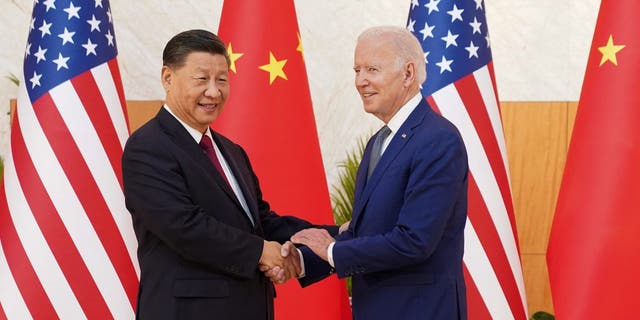
President Biden shakes hands with Chinese President Xi Jinping in Bali, Indonesia, on Nov. 14. (Reuters/Kevin Lamarque)
The SEC placed Microvast on a watchlist in April over financial auditing issues related to its foreign ties, an action that could result in the company being delisted.
The Biden administration chose to award the grant to Microvast despite the SEC’s action and despite the company’s poor financial performance in recent years. In 2021, the company incurred a net loss of $206.5 million and accumulated a deficit of $632.1 million. Its stock price has fallen more than 80% since it first went public.
“Microvast is and has always been headquartered in Texas and we are actively creating more than 1,000 new American jobs with the expansion of our manufacturing operations in Tennessee, Florida, and Colorado,” Microvast Chief Operating Officer Shane Smith told Fox News Digital in a statement.
“Microvast is leading the charge to secure domestic battery production, which will strengthen our country’s manufacturing base and reduce reliance on Chinese manufacturers,” Smith said.
In addition, the company is not “pro-China” and is committed to expanding its operations to North America, a Microvast executive told Fox News Digital in a phone interview Friday.
Former President Trump’s administration awarded Microvast with a $19 million grant for 12 research projects and Gov. Ron DeSantis, R-Fla., has praised the company for helping “position Florida as key player in electric vehicle technology development.”
BIDEN’S ENERGY SECRETARY TOOK MEETING WITH BILL GATES IMMEDIATELY AFTER SENATE CONFIRMATION
The Washington Free Beacon first reported Microvast’s ties to China.
“Giving hundreds of millions of taxpayer dollars to a company whose operations are based in China that refuses to comply with American securities rules is crazy,” Sen. Marco Rubio, R-Fla. — the vice chair of the Select Committee on Intelligence — told the Washington Free Beacon on Monday. “What’s more, any new technology developed in this partnership is almost certainly going to benefit China given Microvast’s operations there.”
“It is just another example of the Biden administration not understanding the threat posed by the Chinese Communist Party.”
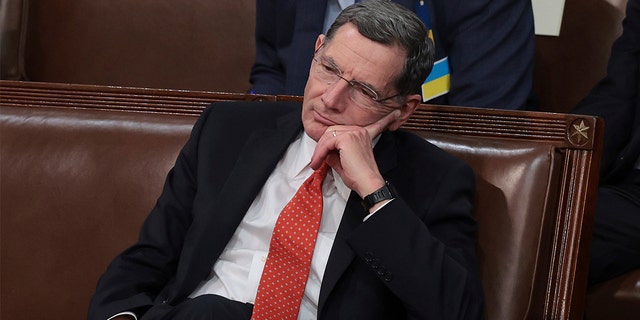
Sen. John Barrasso, R-Wy., is among the GOP lawmakers to express concern over the DOE’s grant to Microvast. (Win McNamee, Pool via AP)
The top Republicans on both the Senate Energy and Natural Resources Committee and House Science, Space and Technology Committee also expressed concern following the report, writing letters to Granholm demanding more information about the DOE’s vetting of Microvast.
CLICK HERE TO GET THE FOX NEWS APP
“I remind you that the Bipartisan Infrastructure Law was ostensibly intended to develop robust domestic manufacturing bases and supply chains free from the predations of the PRC,” Sen. John Barrasso, R-Wyo., the ranking member of the Energy and Natural Resources Committee, wrote to Granholm.
“DOE distributing $200 million in taxpayer funds to a company joined at the hip with China is demonstrably antithetical to the Bipartisan Infrastructure Law’s intent,” he continued. “It is clear DOE’s actions directly undermine the United States’ position in its race against China for technological supremacy.”
The Biden administration has sought to aggressively push a green transition to clean energy, an agenda that includes boosting electric vehicle proliferation. Chinese companies currently dominate the global electric vehicle battery and component manufacturing supply chain.









